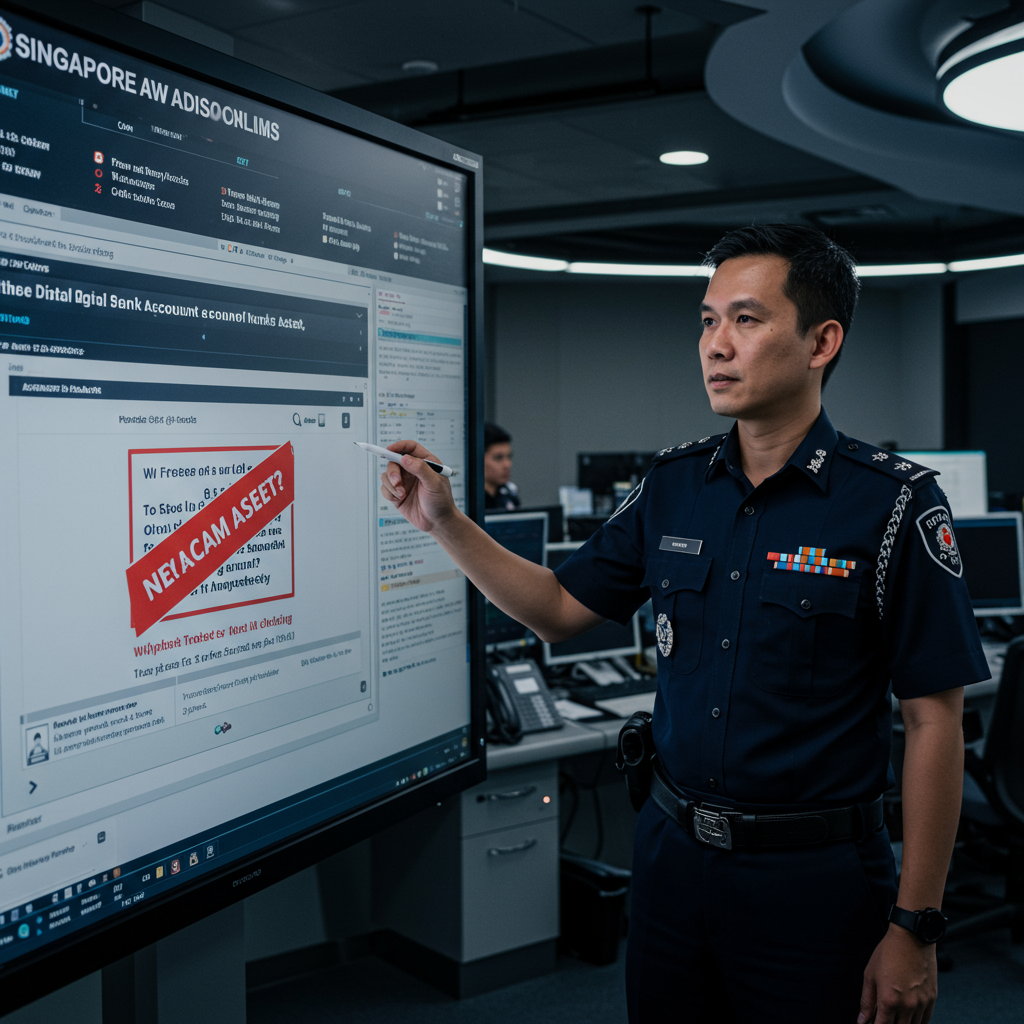Singapore is grappling with a severe surge in financial scams. In response, authorities have enacted a powerful new law granting police unprecedented ability to intervene directly in bank accounts suspected of being involved in ongoing fraud. This drastic measure, which took effect recently, allows officers to freeze funds and block transactions even if the potential victim actively resists believing they are being defrauded.
The move addresses a critical vulnerability law enforcement faced: the inability to stop transfers when a victim, often manipulated by fraudsters, willingly sends money despite warnings. Singapore’s Ministry of Home Affairs (MHA) describes this power as a “last resort,” emphasizing it’s intended solely for the protection of individuals caught in the crosshairs of sophisticated criminal operations.
Police Gain Powerful New Scam Prevention Tool
Under the new Protection from Scams Act, Singapore police now possess significant authority to combat active fraud cases. A key provision allows officers to issue restriction orders against bank accounts if there is compelling evidence the account holder is in the process of transferring funds to a scammer. This intervention can occur even if the individual ignores official advice or family pleas.
The police can direct banks to block potential victims from executing any transactions. This includes freezing access to funds, preventing the use of ATMs, and restricting credit services linked to the account. The core aim is immediate financial lockdown to prevent irretrievable losses.
How Account Control Works Under the New Act
When a restriction order is issued, police take control of the suspected victim’s bank account. According to the MHA, this control can initially last for up to 30 days. If the situation requires more time to resolve or investigate, the police can extend the order for a maximum of five additional periods.
While the police control the account, the owner is not completely cut off from their finances. The law provides for access to funds needed for legitimate reasons, such as daily living expenses and essential bills. However, any access or use of the money during this period is strictly at the discretion of the police, ensuring the primary goal of preventing scam transfers is maintained. This decision-making process by the police is based on facts presented by the individual and their family.
Singapore’s Escalating Scam Crisis
The introduction of the Protection from Scams Act comes against a backdrop of rapidly worsening fraud statistics in the island-state. Authorities reported that financial losses due to scams reached a staggering S$1.1 billion (approximately $860 million USD) in 2024 alone, marking a record high. The sheer volume of cases has also exploded, surging from around 15,600 reports in 2020 to over 50,000 cases by 2024. Some recent data points even put the 2024 figure slightly higher, exceeding 51,000 reports.
Parliamentary discussions highlighted the severity of the issue, noting that a significant majority of losses stem from voluntary transfers by victims. Statistics presented showed that “self-effected transfers” accounted for 86 percent of all scam reports and an overwhelming 94 percent of total financial losses during a nine-month period prior to the law’s passage. This critical point underscores why the ability to override victim consent was deemed necessary.
Common Scams Driving the Need for Intervention
Scammers in Singapore employ a wide array of tactics, constantly evolving their methods. Among the most prevalent types are sophisticated job scams promising lucrative remote work, high-yield investment scams often involving fake platforms, and e-commerce fraud where buyers pay for goods that are never delivered.
Internet love scams have also become a massive criminal enterprise. Fraudsters spend months cultivating deep emotional connections online before fabricating emergencies or opportunities that require the victim to send large sums of money. Cases like a 64-year-old woman who lost S$400,000 to a romance scammer were cited in parliament to illustrate the devastating impact on individuals. The UN Office on Drugs and Crime (UNODC) estimates that countries in East and Southeast Asia lost roughly $37 billion to cyber fraud in 2023, placing Singapore’s problem within a massive regional context.
Balancing Public Safety and Personal Autonomy
While proponents argue the new law is essential to shield vulnerable individuals from devastating financial ruin and curb the overall rise in scam crimes, it has not been without criticism. Some lawmakers and civil liberties advocates have voiced concerns about the measure’s potentially intrusive nature. Questions around accountability for police actions and the possibility of overreach or abuse of power have been raised.
During parliamentary debates, alternative approaches were suggested. These included allowing citizens to opt out of this specific police power or giving individuals the choice to nominate a trusted friend or family member, rather than state authorities, to act as a failsafe and freeze their accounts if scam activity is suspected. The debate highlights the complex challenge of balancing the state’s duty to protect its citizens from criminal harm against individuals’ fundamental right to control their own finances.
The Latest Step in Singapore’s Anti-Scam Effort
The Protection from Scams Act is not the first measure Singapore has implemented to counter the growing threat of digital fraud. It represents the newest layer in a multi-pronged strategy. Since 2023, for example, Singaporean banks have offered users features allowing them to “lock up” a designated portion of their funds, preventing these amounts from being digitally transferred out of their account.
Furthermore, most major banks provide customers with an emergency “kill switch.” This feature enables account holders to instantly freeze their entire bank account and related services if they suspect their account details have been compromised or if they believe they are being targeted by a scam. The new law complements these existing tools by providing an avenue for intervention when the victim is unwilling or unable to protect themselves.
Frequently Asked Questions
How does Singapore’s new anti-scam law allow police to stop suspicious transfers?
The new law grants police the power to issue a “restriction order” on a person’s bank account if they have compelling evidence the person is about to transfer money to a scammer. This order allows police to block transactions, ATM access, and credit facilities, even if the potential victim doesn’t believe they are being scammed, serving as a last resort to prevent financial loss.
Why is this law needed now, given scam rates in Singapore?
The law is a direct response to a massive surge in scam cases and financial losses in Singapore. Scam losses hit a record S$1.1 billion in 2024, with case numbers soaring over 50,000. Critically, authorities found that the vast majority of losses (94% in a recent period) resulted from victims voluntarily transferring funds despite warnings, highlighting the urgent need for police intervention capability in such situations.
Can individuals still access their funds if police seize control of their account?
Yes, under the Protection from Scams Act, an individual whose account is controlled by police can still access funds for essential needs like daily living expenses and bills. However, this access is granted at the discretion of the police. The control is temporary, lasting up to 30 days initially, with the possibility of up to five extensions if necessary to address the ongoing scam threat.
Conclusion: A Necessary, Yet Contentious Measure
Singapore’s Protection from Scams Act marks a significant expansion of state power in the fight against rampant fraud. By enabling police to seize control of bank accounts as a last resort, even against a victim’s will, the law directly targets the challenging scenario where individuals are too deeply manipulated to protect themselves.
While proponents highlight the law’s crucial role in preventing devastating financial harm in an environment of rapidly escalating scam losses and sophisticated criminal tactics, critics raise valid questions about the balance between necessary protection and individual financial autonomy. As the law is implemented, its effectiveness in curbing scam losses and the management of concerns regarding accountability and potential intrusiveness will be closely watched. Ultimately, the act underscores the severity of the scam crisis facing Singapore and the difficult choices authorities are making to combat it.



